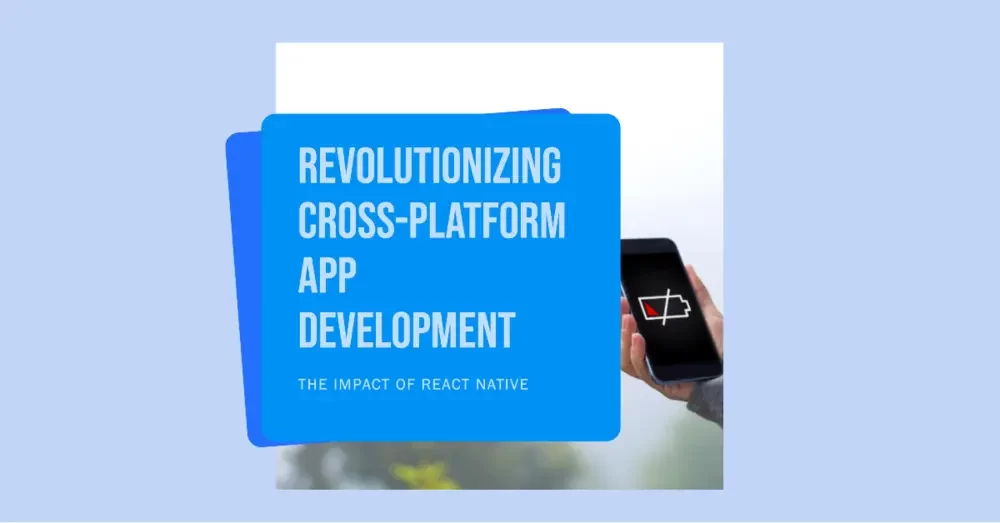Native mobiles have been around for over a decade now. When developed immaculately, they deliver an excellent performance, look visually appealing, and render users with app-specific features that are exclusive to the platform. However, with the advent of cross-platform tools, many software development services companies and developers were considering simultaneously releasing their products on many platforms. Sounds appealing right? Develop once, deploy anywhere, and manage your app with only one team!
Even since then, the biggest tech giants along with reputed software engineers have pondered over this one question- If cross-platform apps could be used in place of native apps? That’s when React Native chimes in the conversation. Apart from being widely popular for cross-platform mobile development, it offers a plethora of benefits for every developer. What made it stand out though? The ability to build an app just using JavaScript. Impressive right.
In this blog, we are going to explore how React Native’s framework has transformed the way developers create mobile applications and why it continues to be a dominant force in the industry.
What Is React Native?
It’s essential to understand what React Native does when researching why to hire react native app developers. React Native is a framework for developing mobile apps that uses JavaScript and React’s declarative vocabulary. This open-source framework curated by Facebook was launched in 2015 and is one of the best libraries for developing native mobile apps for various platforms such as iOS, Windows, and Android. React Native also has a number of reusable components that work across platforms.
React Native is mostly used to create UI components for mobile apps. This software is utilized in over 25,000 apps around the world. Popular apps that employ React Native include Instagram, Facebook Ads, Bloomberg, Walmart, and SoundCloud. React Native helps generate truly native components for enhanced app performance along with a fantastic user experience. It allows developers to build natively-rendered mobile applications for both iOS and Android platforms using a single codebase. This approach has brought about a paradigm shift in cross-platform development.
Advantages of React Native
In a world of software development services, the React Native has ushered in a new era of cross-platform app development with several key advantages:
- Time and Cost Efficiency: React Native significantly decreases development time and costs when compared to designing separate native apps because it uses a single codebase for various platforms.
- Native Performance: Because of its ability to compile code to native components, React Native provides near-native performance.
- Community and Ecosystem: The framework has a thriving community as well as a wide ecosystem of libraries and plugins, making it easy to gain access to pre-built solutions and assistance.
- Hot Reloading: Hot reloading allows developers to observe the impact of code changes in real-time, which speeds up the debugging and development process.
- Smooth User Experience: Apps developed on React Native provide a native-like user experience with smooth animations and a responsive feel.
React Native’s Impact On Cross-Platform Development
Now, let’s discuss the profound impact React Native has had on cross-platform app development:
- React Native enables developers to reach a larger audience by concurrently targeting iOS and Android platforms, hence enhancing market potential.
- React Native offers faster release cycles by easing development, and letting businesses remain adaptable in a competitive market.
- Reduced Development Costs: React Native’s low development costs are a game changer for businesses, particularly startups and small businesses.
- Maintaining and updating apps becomes easier with a unified codebase, eliminating the need for separate development teams.
- The popularity of React Native has resulted in a growing pool of qualified developers, making it easier for businesses to find talent.
Challenges & Solutions
While React Native has had a profound impact, it’s not without challenges. Maintaining compatibility with native modules and keeping up with frequent updates can be demanding. This is crucial for accessing complex or specialized device features not readily available through React Native alone. If you’re seeking to hire React Native app developers, you should look for someone who can maintain compatibility with native modules and keep up with regular upgrades.
However, the React Native community, comprised of developers, contributors, and enthusiasts, plays a vital role in resolving these challenges. They actively work on finding solutions, creating plugins, and providing guidance to help developers overcome compatibility and update-related issues. This collaborative effort ensures that React Native remains a viable and up-to-date choice for app development.
Conclusion
To summarize, React Native has had a transformative impact on cross-platform app development. Its speed, efficiency, and native-like performance have made it a top choice for software development services companies and developers alike. Additionally, Native is cost-effective and includes a massive ecosystem, for developers to try and test it the way they want.
React Native shows no indications of slowing down in the future. It is still evolving, overcoming prior constraints and pushing the limits of cross-platform programming. We should expect even more innovation and improvements as more businesses use it.
